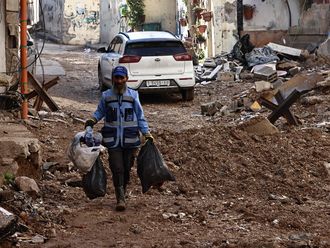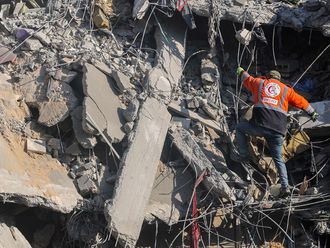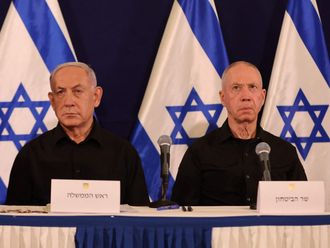Washington: Presidential son-in-law and adviser Jared Kushner and two other top White House aides will soon visit Israel, the West Bank and several Arab capitals to explore prospects for Mideast peace negotiations now that a period of unrest has subsided, a White House official said on Friday.
The trip, spanning several days later this month, is meant to show continued US commitment despite the weeks-long spate of violence and political upheaval in occupied Jerusalem and Jordan this summer, which had threatened to boil over into open conflict.
President Donald Trump remains optimistic about a deal resolving the decades-long conflict between Israel and the Palestinians, and he is seeking advice and support among Arab states Jordan, Saudi Arabia, the United Arab Emirates, Egypt and Qatar, said the senior official. The official requested anonymity to describe the evolving diplomacy.
Trump, the official said, remains “personally committed to achieving a peace deal between Israel and the Palestinians that would help usher in an era of greater regional peace and prosperity.”
Trump is sending Kushner, Mideast negotiator Jason Greenblatt and deputy national security adviser Dina Powell in the hope of capitalising on the calm following the crisis involving Israel’s installation of new security measures for Palestinian worshippers at a disputed holy site in occupied Jerusalem.
The crisis, the first during Trump’s presidency, forced a pause in the phased approach Trump’s advisers have adopted to address the conflict. Greenblatt and Kushner first embarked on a listening and learning effort that acknowledged their newness to the long conflict and entrenched positions. The men had begun to move toward more substantive conversations when violence erupted in July.
“President Trump has previously noted that achieving an enduring Israeli-Palestinian peace agreement will be difficult but he remains optimistic that peace is possible,” the official said. “To enhance the chances for peace, all parties need to engage in creating an environment conducive to peacemaking while affording the negotiators and facilitators the time and space they need to reach a deal.”
The trip comes about three weeks before Trump is expected to meet with Israeli Prime Minister Benjamin Netanyahu during the United Nations General Assembly session in September. It is not yet clear whether Trump will see Palestinian Authority President Mahmoud Abbas during the UN gathering. Trump has invited both leaders to the White House, and the president remarked during Abbas’s visit in May that Mideast peace might not be as hard as is commonly thought.
Kushner suggested that he has a more nuanced view, when he told a group of interns last month that he is not certain there is a solution to the conflict, according to audio of the conversations obtained by Wired magazine.
Israel installed metal detectors at the gates to the sensitive Al Haram Al Sharif shrine after three Palestinians of 1948 areas killed two Israeli police officers there on July 14. Israel dismantled the detectors and additional security devices two weeks later. The intermittent flare of unrest resembled bloody Palestinian uprisings that became known as the first and second intifadas, both of which quashed peace efforts.
The esplanade on which Al Haram Al Sharif stands is considered holy by Muslims, and by Jews, who refer to it as the Temple Mount. Turmoil over access to the holy site left 15 people dead, including three Israelis fatally stabbed in their home in a West Bank colony and two Jordanians, one an alleged assailant and the other a bystander, shot by a security guard at the Israeli embassy in Amman, Jordan.
The previous most recent US peace effort, led by then-Secretary of State John Kerry, collapsed amid recriminations and finger-pointing between Netanyahu and Abbas.
The Trump administration has not sketched any plans for negotiations but has dropped insistence on a separate sovereign Palestinian state as the goal.
Trump tasked Kushner with leading the peace effort, but envoy Greenblatt has had the most direct involvement. This is his first trip to the region since a shuttle diplomacy effort during the crisis last month. It is Kushner’s first trip there since June. Kushner and Greenblatt have sought Arab buy-in for an eventual settlement.











